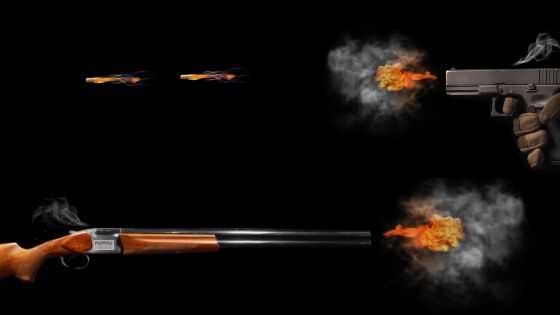
It’s a good time to evaluate how secure your home is from burglars. July through August is the peak season for break-ins. The truly alarming fact is one out of four homes burglarized, someone was at home while it occurred.
You can use many tools to defend your home and property, from fences and security systems to reinforced doors and biometric locks. If you ask a prepper what the most comforting home defense method is, the first answer will almost always be a gun. If you ask a dozen gun owners, what is the best gun for home defense, you’ll get twelve different answers, at least that is what people say. Let’s find out if it is true.
So I’ve been doing some research, and I asked several of my gun-owning friends what they thought was the best gun for home defense. I’ll break down the common home defense gun types, the pros and cons of each, and share with you the response from my friends regarding their opinion of the best gun for home defense.
Best Gun for Home Defense Options
Pistols for Home Defense
When mentioning firearms for home or self-defense, the first thing that comes to mind is a pistol. We define pistols as “a small firearm designed to be held in one hand,” but these devices come in all shapes and sizes. Some larger calibers are better managed with two hands instead of just one, especially for smaller individuals.
Pistols come in various calibers. Make sure you’re choosing one with decent stopping power. According to ballistics testing conducted by the FBI, a pistol or handgun bullet must penetrate between 12 and 18 inches into a ballistics gel target for maximum self-defensive effectiveness. Too shallow, and it doesn’t have sufficient stopping power. Too deep, and it goes straight through your target and may offer diminished defensive capabilities. This list of handgun calibers includes:
- .22 WMR (Winchester Magnum Rimfire)
- .380 ACP (Automatic Colt Pistol)
- 9 mm Luger
- .38 Special
- .357 Magnum
- .40 S&W (Smith & Wesson)
- 10 mm Auto
- .45 ACP
Pros of Pistols for Home Defense
- Maneuverability: You don’t have to worry about maneuvering a long barrel around corners or in narrow spaces with a pistol.
- Accessibility: Small sizes are beneficial here. Instead of dragging a long rifle or shotgun out from under your bed, all you need to do is reach into a drawer or under your pillow to grab a pistol.
- Stopping power: Pistols can have plenty of stopping power if you choose the right caliber and practice with it to improve your accuracy.
- Less chance of gun grab: Without a long barrel, you don’t have to worry about someone snatching the gun out of your hands — as long as you’re careful not to get too close.
- One-handed operation: Its one-handed design leaves you free to open doors, wield a flashlight or call 911 while keeping your target in your sights.
- Concealed carry: Of the several firearm types, pistols are the easiest to conceal, giving you the element of surprise.
Cons of Pistols for Home Defense
- Training: This con will apply to all three types of firearms you might use for home defense. A gun won’t help if you don’t know how to use it or how to hit the target at which you are aiming.
- Size: A tiny pistol might be better for navigating tight corners, but its size can be detrimental, too. The short length of the barrel means you have a smaller sight radius, making accurate targeting more difficult.
- Recoil: The larger the caliber, the greater the recoil. If you’re not used to a large caliber handgun, hitting your target will be nearly impossible.
- Reliability: Failure drills are a must if you’ve invested in a semi-automatic handgun so you’re ready to fix any problems that might arise during an emergency.
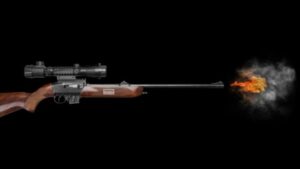
Rifles for Home Defense
We usually think of rifles as tools for hunting, but some are designed for home defense. One of the most common arguments for owning semi-automatic rifles like AR-15s is that they’re ideal for defending your property, and we can agree with that sentiment.
Breaking into a house and seeing someone armed with a pistol can make you think twice. Breaking in and seeing them armed with an AR-15 will make you want to make peace with your maker.
Pros of Rifles for Home Defense
- Magazine capacity: Even stock rifles often have an ammo capacity of up to 30 rounds, making it much easier to defend your home without reloading.
- Customization and upgradability: This pro primarily applies to the AR-15, which is incredibly easy to customize and upgrade as needed. Instead of requiring an extra hand to carry your flashlight, just attach a light to your rail or add a fancy night-vision scope to more easily defend your home.
- Targeting: Opposite the pistol, the rifle’s length gives you a better sight radius, making accurate targeting easier. A common upgrade is a scope improving target accuracy even more. For home defense, an Illuminated Reticle scope is popular because it illuminates the crosshairs with a green or red light. The internal light source allows the user to see in low light settings.
- Ammo variety: Large caliber ammo comes in various sizes, depending on your needs. The 5.56 or .223 rounds are ideal for an AR-15, but make sure you choose a load that fits the rifle you picked.
Cons of Rifles for Home Defense
- Cost: Rifles are expensive, especially if you opt for a semi-automatic model. A custom rig can cost you a minimum of $1,000 if you build one yourself or $2000+ if it’s ordered.
- Barrel length: Like the shotgun, maneuvering a rifle in tight spaces can be challenging.
- Overpenetration: With high-caliber rifles, you don’t just have to worry about your bullet going straight through your target. You also have to worry about it going through a window or wall and potentially putting family members or the neighbors at risk.
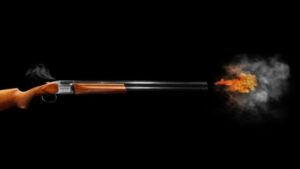
Shotguns for Home Defense
Is there anything more iconic than the sound of someone racking a pump-action shotgun? Shotguns are another common choice for home defense. They come in various sizes, measured in gauges ranging from 10 down to 28. But most people are most familiar with the classic 12 gauge. The larger the number, the smaller the bore.
Shotgun shells also come in various types. Slugs are solid lead and act more like a traditional bullet. It gives the weapon better range while narrowing its field of fire. Slugs can knock down the door of a house or take down an elk. Buckshot and birdshot use a handful of pellets. Buckshots are slightly larger pellets for larger game animals. Birdshot shells are smaller pellets for small animals such as birds. Buckshot is generally considered the best option of the three for home defense.
Pros of Shotguns for Home Defense
- Intimidation factor: Remember that iconic racking sound? While it might not be enough to scare someone out of your home, it is often enough to make them think twice about crossing paths with you.
- Impressive stopping power: Shotguns have significantly more stopping power than pistols, especially if you’re loaded up with buckshot or slugs.
- Reliability: As long as you’re not buying a fancy combat shotgun, these weapons are incredibly reliable, simple to take care of, and easy to use.
- Safety: There is a lower risk of shotgun pellets penetrating through walls. This limits the risk to family members and neighbors.
- Affordability: Shotguns start at $300 for a base model. This starting price point makes it the most affordable option among pistols, rifles, and shotguns.
Cons of Shotguns for Home Defense
- Slow reload speed: The average shotgun only holds between five and seven rounds, and you must reload these one at a time. That’s fine if you stop your intruder quickly, but you might be in danger if you have to reload.
- Intense recoil: You can brace it against your shoulder, but a shotgun still has a significant kick. You’ll have to absorb the recoil or adjust quickly to maintain your targeting. If you have back or shoulder problems, then this is not the ideal gun for you.
- Difficult to maneuver: A home defense shotgun with a standard 18-inch barrel has a total length of around 39 inches or over 3 feet. Maneuvering that in narrow hallways or around corners can be challenging. It also increases the chances that someone could grab the barrel and either redirect your blast or snatch it out of your hands.
- Damage: Buckshot and birdshot create a large fire spread, increasing the amount of collateral damage.
The Best Gun for Home Defense – The answers collected from my gun-owning friends:
Military Trained Friend – “A 12-gauge pump shotgun. The pellets stop in the wall, so you don’t have to worry too much about harming others in the house, and usually, the sound of a shotgun racking is enough of a deterrent that you may not have to shoot.”
Hunter Friend – “A 12-gauge short barrel shotgun. It spreads fast and won’t go through the walls as easily. The 12-gauge is cheap and easy to get.”
Carpenter Friend – “All my guns are for target practice or hunting. I decided a long time ago that I don’t feel comfortable using them for self-defense, so I keep them locked up.“
Business Owner Friend – “I just built a 300 Blackout Pistol (aka AR rifle) that will be my home defense gun. It’s called a pistol due to the short barrel. Super easy to shoot, comfortable, and not too bulky. Not a big fan of shotguns for home defense. I guess I would like to be able to hit something further away if it came to that.”
Law Enforcement Friend – “A 12-gauge or 20-gauge shotgun“.
Fellow Blogger Jim Cobb – “There is perhaps no sound more pants filling to an intruder than that of a shell being racked in a shotgun. A shotgun offers low risk of overpenetration in a home defense situation.” from his book Prepper’s Armed Defense.
Authors David Kobler and Mark Goodwin – “Shotguns like the Mossberg 500 can switch barrels in less than one minute. The shorter 18-inch barrel is perfect for home defense, and a 26-inch barrel is great for hunting.” from their book Retreat Security and Small Unit Tactics.
Retired Navy SEAL, Mark “Coch” Cochiolo – “home defense guns…the set-up that I personally use is a 300 Blackout.
This YouTube video was made by Tactical Hyve. Check out some of their other informative videos and don’t forget to subscribe!
What’s the Best Gun for Home Defense?
The answer to that question isn’t as straightforward as you might think. When it comes down to it, the best gun for home defense is the one you practice with and know how to shoot. You can buy every weapon in the shop, but if you don’t know how to load it, operated it, or hit what you’re aiming at, you’ve got a lot of expensive paperweights on your hands.
If you are just beginning your journey as a gun owner, find the nearest indoor shooting range. Most indoor shooting ranges have a wide variety of guns to rent, so you can try them out before you buy one that might not be right for you. Testing out all three options is a great way to determine the best fit for you.
Hopefully, this information will aid you in the process of weighing the pros and cons to determine what home defense firearm might work best for you.
– – – – – – – –
This post contains affiliate links. Thank you for visiting Preppers Survive and using the affiliate links to make purchases at no extra cost to you. Your support makes this site possible.
Before you leave, subscribe to our newsletter. If you enjoyed this article, Best Gun for Home Defense, please share this article on your favorite social media.
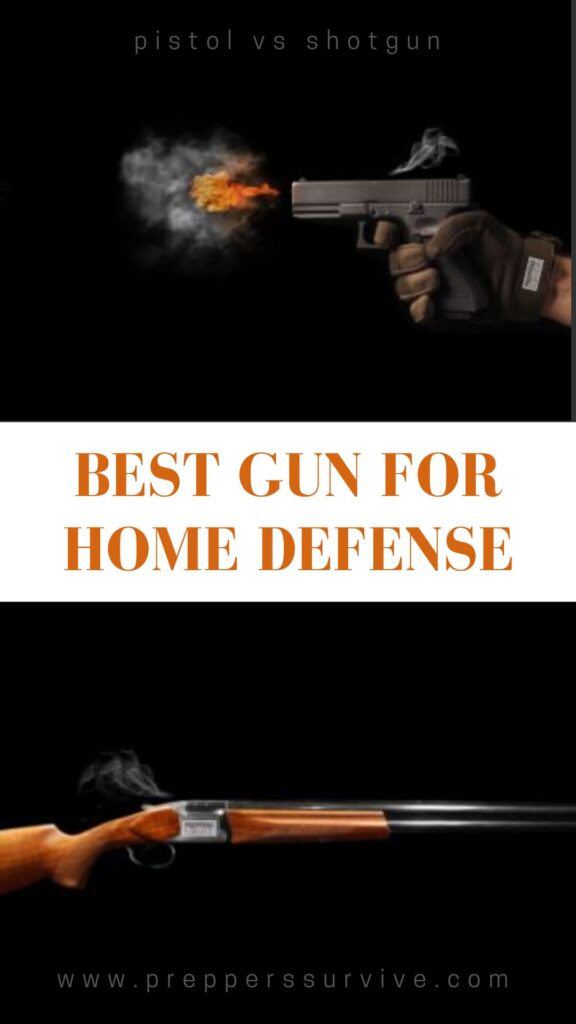


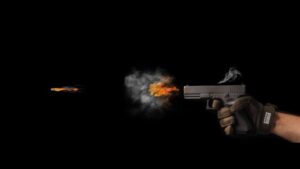
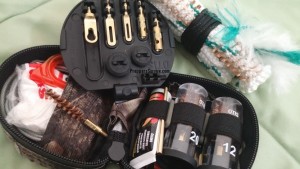
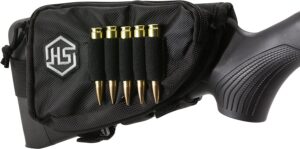
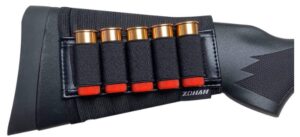
Hadn’t thought about a rifle but it makes sense!